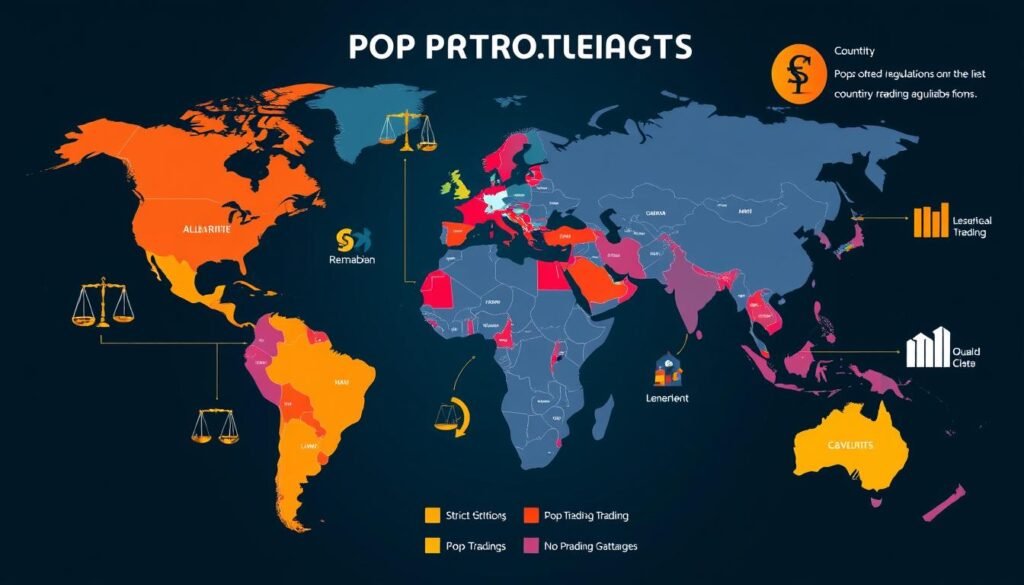In the Forex market, every small change can mean a lot of money. The question “Is Prop Firm Trading Allowed in the Forex Market?” is very important. Proprietary trading means firms trade with their own money, not for clients. They aim to make profits directly from the market.
This practice is full of chances but also faces strict Forex trading regulations worldwide. These rules vary, leading to a big debate on proprietary trading legality in the Forex market.
This article will look into the legal, financial, and ethical sides of proprietary trading. We’ll see if it’s okay in the Forex market. We’ll also explore how rules might change with the market’s growth and its impact on those leading this financial challenge.
Key Takeaways
- Examination of proprietary trading’s status in the Forex market against current regulations.
- Insight into the unique nature of prop trading compared to traditional client-based Forex activities.
- Discussion on global perspectives and how they affect the legality of prop firms trading Forex.
- Clarification of the impact of financial governance on proprietary trading operations.
- Forecasting the challenges and potential shifts in legislative trends concerning prop trading in Forex.
Understanding Proprietary Trading Firms in Forex
Proprietary trading firms, or prop firms, are key in the Forex market. They let individual traders use large amounts of capital. This is different from brokerages that use client money.
Proprietary trading in forex means traders use the firm’s money. This boosts their trading power without risking their own money. Traders often get 50% to 90% of their profits.
Proprietary trading firms offer more than just capital. They also give support and training. This helps traders learn how to make money, manage risks, and understand the Forex market.
| Feature | Proprietary Trading Firms | Traditional Brokerages |
|---|---|---|
| Capital Source | Firm’s own capital | Client’s funds |
| Risk to Trader | Minimal personal risk | Significant personal risk |
| Profit Sharing | High (50-90% of profits) | None (profits fully retained by trader) |
| Support and Training | Extensive | Limited |
Proprietary trading firms offer big advantages. They provide more capital and help manage risks. This creates a professional environment for traders to grow.
But, working with a prop firm has its challenges. Traders must follow the firm’s rules and share profits. There’s also pressure to perform. Still, the fast-paced world of proprietary trading in Forex offers great chances for success.
Rules and Regulations Governing Prop Trading in Forex
The Forex market’s proprietary trading is shaped by Forex trading regulations and prop trading rules. Strict oversight by global regulatory bodies is key. It’s vital for any firm in this field to know the rules.
Global Regulatory Bodies and Their Impact
Worldwide, regulatory bodies set and enforce standards for Forex prop firms. The Commodity Futures Trading Commission (CFTC) in the U.S. and the Financial Conduct Authority (FCA) in the U.K. are key. They oversee Forex markets.
These groups ensure fairness and protect investors. For prop trading firms, not following these rules can mean big fines or even being shut down.
Key Compliance Issues for Prop Firms
Prop firms face many compliance challenges. They must meet capital requirements, follow leverage limits, and have strong risk management. These steps help keep the firm stable and clients confident.
Keeping up with reporting standards is also key. Prop firms must report on market positions, risk, and trading activities. This makes the Forex market more transparent.
| Regulatory Body | Key Compliance Focus | Impact on Prop Firms |
|---|---|---|
| CFTC (US) | Risk management, Fair market practices | High regulatory compliance costs |
| FCA (UK) | Capital adequacy, Reporting standards | Strict operational guidelines |
| ASIC (Australia) | Investor protection, Market integrity | Enhanced investor confidence |
It’s essential for prop trading firms to follow Forex trading regulations and prop trading rules set by global regulatory bodies. This ensures their legitimacy and success in the Forex market.
Legality of Proprietary Trading in the Forex Market
Looking into proprietary trading legality in the Forex market shows a complex scene. Forex market restrictions play a big role. Laws and rules are key to how proprietary firms can work. This part talks about the laws that guide these trading groups in different places.
In the United States, the Commodity Futures Trading Commission (CFTC) and the National Futures Association (NFA) are very important. They make rules to keep the market fair and safe. These rules affect how proprietary trading firms do business.
| Country | Regulatory Body | Impact on Proprietary Trading |
|---|---|---|
| United States | CFTC, NFA | Strict compliance and reporting requirements |
| United Kingdom | Financial Conduct Authority (FCA) | Emphasis on risk management and capital adequacy |
| Japan | Financial Services Agency (FSA) | Regulations on high-frequency trading activities |
| Australia | Australian Securities and Investments Commission (ASIC) | Protective measures against market abuse |
These groups make sure proprietary trading firms act fairly and openly. It’s very important for these firms to know the proprietary trading legality in the places they work.
Knowing about Forex rules all over the world is key for proprietary firms. It helps them trade well and safely.
Following the law helps firms trade better and avoid big problems. It makes the Forex market safer and more reliable for everyone.
How Prop Firms Operate Within Forex Constraints
Forex trading firms are always finding new ways to succeed in the Forex market. They use smart strategies and strong risk management to make money and avoid big losses. This part explains how prop firms handle the challenges of the Forex market.
Prop Trading Strategies and Forex Market Dynamics
The Forex market is very unpredictable. So, trading firms use both technical and fundamental analysis to make their decisions. They also use advanced algorithms and fast trading systems to find and use market gaps.
They also keep an eye on economic news and global events. These things can change how much money something is worth.
Risk Management Approaches by Prop Firms
Managing risk is key for a trading firm to stay in business. They set clear limits on how much they can lose, use hedging, and trade different currency pairs. They also watch the market closely to adjust their plans as needed.
This way, trading firms can make money while keeping their investments safe from sudden changes in the market.
Examining Prop Trading Rules by Country
Looking into Forex trading regulations by country shows a mix of rules and guidelines. These are set to keep financial markets stable and guide trading. It’s important to understand how these rules affect prop trading firms.

It’s key to see how these rules differ from one place to another. These differences often show the local economy, politics, and culture. They affect how prop firms plan and work within these rules.
| Country | Key Regulatory Body | Main Prop Trading Regulations |
|---|---|---|
| United States | Securities and Exchange Commission (SEC) | Strict adherence to risk management rules, frequent audits and compliance checks |
| United Kingdom | Financial Conduct Authority (FCA) | Emphasis on transparency, robust client fund protection measures |
| Japan | Financial Services Agency (FSA) | Cap on leverage, mandatory licensing for Forex trading |
| Australia | Australian Securities and Investments Commission (ASIC) | Regulations focusing on trader education, mandatory risk warnings |
The Forex trading regulations by country are vital for prop firms. They guide how firms follow rules and shape their market role. Knowing these prop trading guidelines is crucial for firms wanting to trade globally while following local rules.
Proprietary Trading Vs. Retail Forex Trading
In the Forex market, proprietary trading and retail Forex trading are two different paths. Each has its own rules and goals.
Distinct Characteristics of Prop Trading
Proprietary trading firms use their own money, not their clients’. This means prop traders can keep all their profits. They don’t have to deal with client money worries.
Prop firms face fewer Forex market restrictions than retail traders. They can use more leverage and advanced tools. This lets them handle bigger, more complex trades.
Contrasts in Trading Platforms and Tools
Prop traders use advanced platforms for complex strategies. These platforms are costly and require a lot of tech. They’re not for everyone.
Retail Forex trading uses simpler platforms. These are easier to use and are for traders of all levels. They focus on being accessible and user-friendly.
Knowing these differences helps traders choose the right path for their goals and skills in the Forex market.
Different Types of Forex Prop Trading Firms
Exploring Forex trading firms is key for those new to the field. Proprietary trading, or prop trading, covers many firm types. Each focuses on different strategies and markets. This section will look at the various proprietary trading firms and their special areas in the Forex market.
Prop trading firms fall into several categories based on their strategies and size. These include:
- High-Frequency Trading (HFT) Firms: These firms use advanced algorithms for quick trades. They aim to profit from small price differences, needing fast technology and data.
- Quantitative Trading Firms: Quant firms rely on data analysis for trading. They create models to forecast market trends using large datasets.
- Discretionary Trading Firms: These firms make trades based on human decisions. Traders use their experience and intuition to decide.
- Global Macro Firms: These firms bet on big economic events. They predict market changes based on economic factors like policies and indicators.
Each Forex trading firm type offers unique risks and rewards. They vary in strategies, technology, and risk management. This diversity shapes the market.
Let’s compare these firms to see their focus and reach:
| Type of Firm | Focus Area | Technology Use | Risk Management |
|---|---|---|---|
| High-Frequency Trading (HFT) Firms | Price inefficiencies | High | Algorithmic Risk Controls |
| Quantitative Trading Firms | Model-based predictions | High | Statistical Risk Analysis |
| Discretionary Trading Firms | Trader expertise | Low to Moderate | Individual Trader Discretion |
| Global Macro Firms | Economic events | Moderate | Portfolio-level Hedging |
Knowing about these types of proprietary trading firms helps in choosing the right one. It also shows the wide range of methods used in Forex trading.
The Role of Compliance in Prop Firm Forex Trading
For proprietary trading firms in the Forex market, Compliance in Forex is more than following rules. It’s a key strategy that opens up the market and builds trust with traders. The complex global Forex market regulations require proprietary trading firms to have strong compliance systems.
Developing a Compliance Framework for Prop Firms
To build a solid compliance framework, firms need to start by understanding all relevant laws. They must keep up with global standards by learning new laws. This means making sure trading activities follow these rules and training traders well.
Regular checks and training are essential for keeping things transparent and responsible.
Case Studies: Prop Firms Adapting to Regulatory Changes
The Forex industry’s fast-changing rules can be tough, but also offer chances. For instance, some firms use new rules to find unique areas to focus on. They watch for law changes to manage risks and plan their strategies.
In summary, compliance in Forex is a constant effort for proprietary trading firms. By following rules, they avoid fines and stay ahead in the market. A well-made compliance plan is crucial for adapting and growing in the global Forex market regulations.
Forex Market Accessibility for Proprietary Traders
The Forex market is always changing, offering different levels of Forex market accessibility for traders. Proprietary trading firms have their own set of advantages and challenges. Knowing how these firms work in the Forex market can give us a better understanding of the trading world.
Proprietary trading firms are known for their bold and complex trading plans. Their access to the Forex market depends on rules and technology. These firms use a lot of money and advanced tools, making big trades that can change the Forex market.
- Direct access to liquidity providers and major exchanges
- Advanced platforms that offer high-speed trading
- Opportunities to participate in interbank trading
Rules from regulators are key in how accessible the Forex market is for these firms. Each place has its own rules, affecting things like how much money can be borrowed and what reports are needed. Proprietary trading firms must figure out these rules to stay competitive and make money.
Forex markets are a big deal for proprietary trading firms, offering great chances but with strict rules.
| Region | Accessibility Level | Key Regulations Impacting Access |
|---|---|---|
| United States | High | Dodd-Frank Act limitations on leverage and derivatives |
| European Union | Moderate to High | MiFID II requiring transparency and reporting |
| Asia-Pacific | Varies widely | Diverse regulations from country to country |
In summary, Forex market accessibility for proprietary trading firms is shaped by many things like rules and market conditions. These firms usually have the skills and resources to deal with these issues well. The future will likely see more changes as technology gets better and rules around the world change.
Risks Associated With Prop Trading in Forex Markets
Proprietary trading in Forex markets comes with many risks. These risks can greatly affect a firm’s success. Market volatility and high leverage are major concerns that need careful handling.
Market Volatility and Prop Trading
Market volatility is a big worry for Forex traders. It means sudden, unpredictable changes in the market. These changes can lead to big wins or big losses.
How well a firm handles these changes depends on their risk management. It also depends on the traders’ knowledge of the market.
The Balance Between High Leverage and Prop Firm Success
High leverage is another key part of Forex trading. It lets traders make a lot of money from small price changes. But, it also means big risks, which can lead to big losses.
Managing leverage well is key for prop firms. It helps them avoid big financial risks while still making the most of market chances.
Here’s a look at how different levels of market volatility and leverage affect prop trading firms:
| Level of Volatility | Low Leverage Usage | High Leverage Usage |
|---|---|---|
| Low | Stable, modest profits | Higher profit potential but not maximized |
| Medium | Increased profit potential with moderate risk | Significant profit potential but with high risk |
| High | High risk and potential for losses | Very high risk with possibility of substantial losses |
Comparing International Forex Market Restrictions
Understanding international Forex restrictions is key for trading firms worldwide. This comparison shows the different rules in Forex markets. It points out trends and unique rules that impact trading.
Every country has its own rules for Forex trading. This makes the trading environment different in each place. For trading firms, knowing these rules well is crucial for success.
| Country | Forex Trading Restrictions | Regulatory Body |
|---|---|---|
| United States | High leverage restrictions; stringent broker licensing | Commodity Futures Trading Commission (CFTC) |
| United Kingdom | No caps on leverage; strict consumer protection laws | Financial Conduct Authority (FCA) |
| Japan | Low leverage limits; extensive disclosure requirements | Financial Services Agency (FSA) |
| Australia | Moderate leverage use; emphasis on transparency | Australian Securities and Investments Commission (ASIC) |
The comparison of Forex market regulations shows big differences in Forex management. For example, the U.S. has stricter leverage rules than the UK. This affects how firms trade and how much money they need.
In short, dealing with international Forex restrictions means always checking the local rules. This is vital for staying in line and doing well in Forex markets.
Examining the Financial Instruments Used by Forex Prop Firms
In the world of Forex proprietary trading, choosing the right financial instruments is key. These tools help firms adapt to market changes and increase profits. By looking at derivatives, spot Forex, and futures, we see how they help in making strong trading plans and managing portfolios.
Influence of Derivatives on Prop Firm Trading
Derivatives give Forex prop firms the chance to manage risks and guess future prices without owning the assets. Using derivatives wisely lets firms grow their market presence and make the most of market gaps. Options and swaps are common in Forex, each with its own role in managing risks and making bets.
Spot Forex and Futures in Prop Firm Portfolios
Spot Forex and futures are essential in Forex trading for prop firms. Spot Forex lets firms trade currencies right away, responding quickly to news and events. Futures, on the other hand, help firms protect against Forex price swings and secure prices for future trades, keeping their investment plans stable.
Managing derivatives, spot Forex, and futures shows the detailed strategy prop firms need to stay ahead in Forex. It highlights the importance of these tools in creating a varied and successful trading portfolio. This portfolio can handle market challenges and seize new chances.
Key Players in the Proprietary Forex Trading Industry
The Proprietary Forex trading industry is full of life. It has both big institutions and solo traders. They all play a big role in making the market better with new ideas and lots of trading.
| Firm | Region | Contribution to Forex Trading |
|---|---|---|
| Interactive Brokers | Global | Extensive market access and advanced trading platforms. |
| Saxo Bank | Europe | Innovative trading tools and competitiveness in currency spreads. |
| FTMO | Global | Development of a comprehensive educational and support network for proprietary traders. |
There are also big names in proprietary trading that don’t always get the spotlight. They are key in making new trading strategies and moving the market. They use economic data to make the most of market changes.
- Risk management frameworks
- Advanced quantitative models
- High-frequency trading algorithms
The work of these key players in Forex goes beyond just trading. They help shape rules and push the market forward with new tech. As the industry grows, these leaders keep setting the bar high for Forex trading.
Strategies for Navigating Forex Trading Restrictions as a Prop Firm
In the fast-changing world of finance, proprietary trading firms face big hurdles with Navigating Forex restrictions. They need new strategies and a strong focus on following rules.
Revising Trading Models
Prop firms must change their trading models to meet Forex rules. They look at risk management, how much leverage they use, and the types of trades. It’s key to follow both local and global rules to stay legal and effective.
Enhancing Trader Education
Education is key for following rules. Prop firms spend on training to keep traders up-to-date on new rules and how to manage risks. This helps them follow Forex rules better and trade better too.
Utilizing Advanced Technology for Regulatory Arbitrage
Implementing Superior Analytics
Prop firms use top-notch analytics and algorithms for regulatory arbitrage. These tools help find and use market gaps without breaking rules.
Automating Compliance Processes
Automation makes compliance better for prop firms. It cuts down on mistakes and makes things more efficient. Software that checks for rule breaks helps avoid problems and keeps things running smoothly.
| Strategy | Benefit | Key Consideration |
|---|---|---|
| Advanced Analytics | Exploit market inefficiencies | Must be tailored to specific regulatory environments |
| Automated Compliance Software | Prevent potential breaches | Requires regular updates in line with changing regulations |
| Trader Education | Enhance adherence to regulations | Continuous training on latest Forex changes |
| Revised Trading Models | Align with regulatory standards | Focus on risk management and leverage limits |
Measuring the Impact of Regulation on Prop Firm Performance
The impact of Forex regulations on proprietary trading performance is key for financial experts and trading companies. Tighter rules mean firms must understand how they affect work and market plans. This part looks at how firms measure these effects and change their plans.

Recent trends show strict rules change trading methods and risk plans for prop firms. Firms adjust to these changes by looking at different performance signs. These include return on investment (ROI), how much the market moves, and costs to follow rules.
| Performance Metric | Pre-Regulation | Post-Regulation |
|---|---|---|
| ROI (%) | 15 | 10 |
| Volatility Index | 25 | 30 |
| Compliance Costs ($) | 50000 | 75000 |
The table shows the impact of Forex regulations clearly. There’s a rise in rule-following costs and a drop in ROI and market stability. These changes force firms to create new, rule-following trading plans.
Also, prop firms’ long-term success in Forex depends on their ability to innovate under these rules. By studying these metrics, firms can set goals that keep them profitable while following rules.
The Future of Proprietary Trading in the Forex Market
Looking ahead, the forex market’s future is shaped by regulation, technology, and market forces. Forex trading firms will use advanced tools and fast trading systems to stay ahead. They need to make quick decisions, thanks to AI and machine learning.
But, they must balance aggressive trading with strict global rules. This balance is key to success.
Blockchain and digital currencies will change how forex markets work. These changes could make transactions safer and faster. But, firms must update their ways to keep up and make money.
Proprietary trading in Forex will need firms to be quick and creative. They must adapt to new rules and tech.
The path for Forex trading firms will depend on their ability to keep up with rules and tech. Firms that do well will be ready for the future. They will grow and succeed in a changing world.












